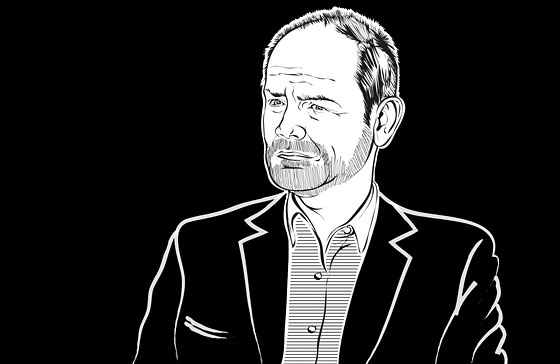
While the staff of the New York Times has been absorbed in hurricane and election coverage, it’s also kept a wary eye on a big story brewing in its own headquarters—the imminent arrival of the new CEO, Mark Thompson, the former director-general of the BBC who starts at the paper on November 12. He does not arrive with the full confidence of the Times’ journalists.
“People are going to start paying closer attention, and that probably isn’t good for newsroom morale,” says one Timesman, “because there’s now a widely held sense that this guy’s story doesn’t add up.”
Thompson’s hiring was supposed to hit the RESET button following the chaotic ouster of the Times’ last CEO, Janet Robinson. At the BBC, he succeeded in turning the media company into a global digital enterprise; the bet was that he’d do the same for the Times. But in a stroke of misfortune now common to Arthur Sulzberger Jr.’s tenure as publisher, Thompson has found himself the subject of inquiry in a massive scandal involving an alleged serial pedophile, the now-deceased BBC-TV star Jimmy Savile. Thompson, a onetime news editor, was head of the network when a BBC documentary investigating Savile’s predatory behavior toward teenagers—reportedly well known in BBC circles—was killed in favor of a celebratory retrospective. After denying any knowledge of the episode to Sulzberger, Thompson admitted that he had learned about the existence of a report on Savile at a cocktail party, but never knew its specific focus. This despite the seven different stories about the documentary in the British press, including a Daily Mail piece headlined “BBC Axes Exposé Into Jimmy Savile Teen Sex Allegations.”
I spoke with a dozen Times sources, none of whom would go on record about the incoming CEO. But the consensus was that the whole thing seems fishy. “How do you not know?” asks one editor. “And is that someone you want? I mean, I don’t know if he was a bold choice [for CEO], but he’s a problematic choice. People are waiting for the other shoe to drop.” A veteran reporter adds, “There’s a feeling that he should have been on it. He came up through the news side, so as journalists we all think his journalistic instincts should have kicked in, and his responsibility to protect the BBC should have felt more urgent.” The best-case scenario, say newsroom staffers, is that Thompson was alarmingly negligent, failing to head off the damage that the scandal would do to his network.
Since being named CEO, Thompson has held group and individual meetings with editorial staff. Both former executive editor Bill Keller and business columnist Joe Nocera came away with as many questions as answers, some of which Nocera made public in a much-dissected October 30 column. Meanwhile, in late October, executive editor Jill Abramson sent top investigative editor Matt Purdy to London to report on Thompson’s involvement in the scandal. Some in the newsroom saw this as just a cover-our-ass move that didn’t go far enough. Purdy was only in London for a little more than a week and filed two articles that did not get to the bottom of the larger story. On the corporate side, Sulzberger has done no further vetting beyond asking Thompson for his version of events and taking him at his word. He has not asked to see Thompson’s e-mails from the period or to supply any documentary evidence that might exonerate him.
Now all eyes are on a parliamentary inquiry into the BBC’s culture that is under way in England, as well as a separate investigation into its management’s actions with regards to the shelved documentary on Savile. Like the sordid investigation into phone hacking by Rupert Murdoch’s tabloid newspapers, those inquiries are likely to drag on for months.
In the newsroom, there’s speculation that Thompson is only being brought in for a year or two, a transitional figure meant to make hard decisions about the business before handing the rejiggered company over to a longer-term caretaker CEO. Even if that’s true, his first day in the job coincides with a sustained period of potential bad news for the Times, which will be obligated to cover every new development out of London. After the full-court press that the Times ran on News Corp.’s scandal, the Murdoch-owned New York Post and Wall Street Journal are likely to feel the same sense of duty.
Have good intel? Send tips to intel@nymag.com.